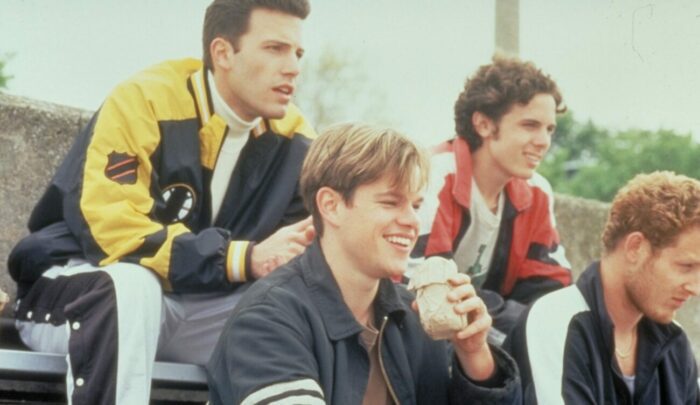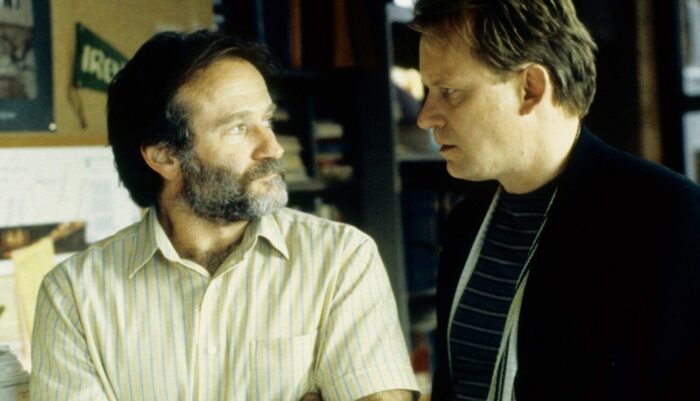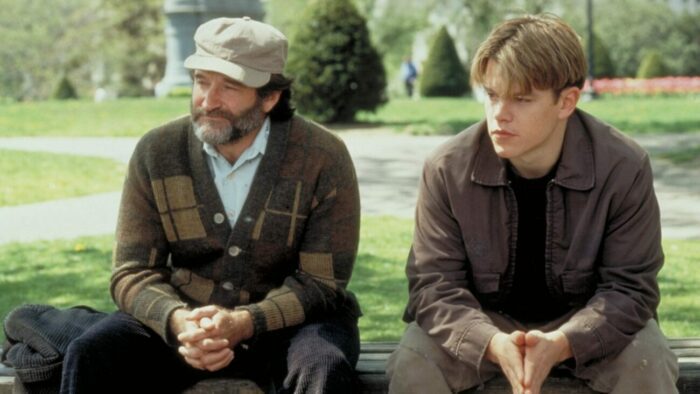Good Will Hunting is a film about the art of accepting yourself for who you are, a lesson I needed in 1997 and still need now.
Matt Damon and Ben Affleck won Academy Awards for writing their breakout hit Good Will Hunting, and one could make the argument that they won due to the Miramax Oscar campaigning during the 1997/98 awards season. It was a good narrative. Two (relatively) struggling actors wrote a script, and the film ended up being good. It also didn’t hurt that Damon and Affleck were good-looking and charming.
I must say, though, after rewatching it all the way through for the first time in years for its 25th anniversary, I think they might’ve won because the script is very good. It’s not perfect, but it achieves everything it sets out to do. Good Will Hunting is at times a funny hangout movie about a group of friends living in Southie (South Boston) and at other times a dramatic film about a damaged person undergoing therapy with a damaged therapist. It’s also a love story about two people from two different worlds.
I saw this movie for the first time on VHS sometime in early 1998, and I loved it immediately. I love a dialogue-heavy script, and this one delivered. Not only that, but the performances from relative unknowns Damon and Affleck (I’d seen them before in things, but they were apparently unmemorable to me until this film) struck me as authentic enough for me to buy the world that was created.

This is a movie with Robin Williams in it, and yet, particularly at the time, it all felt real to me. I didn’t grow up with much, and while I don’t want to give the impression my life was all that similar to Will, Chuckie, and the friend group in the film, their situation felt familiar to me. To this day, it feels weird and awkward to be in an upper-class environment, whether it’s people with more money than me or more education than me. I’ve never had the anger Will had, but I understood how he felt, knowing he had something special but not the means to do anything meaningful with it.
As time has gone on, I’ve also come to understand how much of an excuse that is. I mean, I don’t fault Will for not wanting to leave his comfortable life. Both he and we know that he wants more but is ultimately afraid of leaving it. That could be because he doesn’t think much of himself. But it could be that he believes he’s better than others, but at the same time recognizes that society believes the opposite about him.
Growing up without money sucks. It just does. Sure, one can have family and friends who light up one’s life, but I cannot keep a straight face when someone dares to state how money is meaningless. It means something. Not because I deem it so but because society as a whole does.
It’s the same thing with where one gets their education. It makes a world of difference if I earned my English degrees at prestigious universities, rather than state and local universities, as I did. And, again, it has a heck of a lot less to do with how I see things than how, generally, others do.
That’s life. Still, I also know that I’m the one in control of my own life. Being afraid of how the world sees me is not an excuse for not being me, even if it’s really difficult to be sometimes.
As I’ve grown older, it’s interesting to see Will be so okay with throwing away his potential. Thankfully, this is a movie, so he has a best friend willing to set him straight at the start of Act 3. In what is one of my favorite scenes in Good Will Hunting, Will and Chuckie have this exchange. It’s after Will basically admits he’s turning his back on a possible future that would see him leave his current life behind, and it’s Affleck’s standout moment in the film:
CHUCKIE: [Y]ou don’t owe it to yourself man, you owe it to me. ‘Cause tomorrow I’m gonna wake up and I’ll be 50, and I’ll still be doin’ this shit. And that’s all right. That’s fine. I mean, you’re sittin’ on a winnin’ lottery ticket. And you’re too much of a pussy to cash it in, and that’s bullshit. ‘Cause I’d do fuckin’ anything to have what you got. So would any of these fuckin’ guys. It’d be an insult to us if you’re still here in 20 years. Hangin’ around here is a fuckin’ waste of your time.
WILL: You don’t know that…
CHUCKIE: Let me tell you what I do know. Every day I come by your house, and I pick you up. And we go out, we have a few drinks, a few laughs, and it’s great. Know what the best part of my day is? For about ten seconds when I pull up to the curb and when I get to your door. ‘Cause I think maybe I’ll get up there and I’ll knock on the door and you won’t be there. No goodbye, no “see you later.” No nothing. You just left. I don’t know much but I know that.
Will does just that at the film’s close, and both we and Chuckie can’t help but smile. It’s a tough thing to move on and grow as a person, but it’s necessary and beautiful to embrace who you are. Will leaving to find Skylar is more than the next step in a love story. It’s Will realizing that he’s more than a lower-class, blue-collar worker. He’s more than a genius who can do incredible math. He’s also capable of love.
Look, I get it. Love isn’t enough for most people. For most, money and education are more important than a chemical reaction. Fair enough. But when society places such things higher than human emotion, what are those who cannot have a lot of money or education supposed to do? The film makes it clear that Will’s emotional problems stem from his treatment as a foster child. This, in turn, has affected his relationships with people, particularly a possible love like Skylar.
It’s more than that, though, isn’t it? Will’s problems with intimacy have less to do with past abuse than how he sees himself as not good enough for Skylar, someone rich who’s going to Harvard. At Good Will Hunting’s end, Will finally believes in himself to not only embrace his potential for a life where there’s money and a more society-accepted form of education (working with MIT professor Gerald Lambeau, a Fields Medal winner, rather than learning everything from library books). He believes that he can love and be loved for who he is.

Chuckie and Skylar are big parts of that, but so is Dr. Sean Maguire, played by Robin Williams in what is easily one of his three best film performances (next to The Fisher King and One Hour Photo). Over the course of the film, Will and Sean’s interactions during therapy sessions allow for the former to open up. It helps that they are from the same part of Boston and that Sean doesn’t take any of Will’s nonsense, unlike the other therapists Will tortures by essentially being an asshole.
Sean is a professor at a community college who gave up on life after his wife passed years ago. Late in the film, Sean and Lambeau get into a heated argument, and Lambeau straight-up says that Sean was smarter when they were younger and that he’s smarter now. It’s clear that Sean could’ve taught psychology in a place other than Bunker Hill Community College, but as he tells Lambeau, his choices since his wife died were premeditated. He knew what he was doing by turning away from whatever life he once had.
Facing a life without his wife was probably unbearable to Sean, and it makes sense to me why he would cut himself off from the world in a not-so-dissimilar way that Will cuts off the world. It’s safer to keep those you care about at arm’s length (or farther).
It turns out that as much as Sean helps Will to believe in himself, Will teaches Sean that living a life without his wife is okay. I mean, sure, this kind of mentor teaches the student and in return, the student teaches the mentor narrative is nothing new, but I appreciate the way director Gus Van Sant allows for improv in scenes throughout Good Will Hunting to inject some realism into the film.
I received the published screenplay for Christmas the following year, and it was interesting seeing how different the dialogue was in both scenes with Will and his friends and scenes with Will and Sean. Of course, I shouldn’t be surprised by Williams’ ability to improve. He was a master. Van Sant allowing for Damon and company to improv was a wise decision, though, because seeing these four men behave like seemingly real people helps ground Will’s world.
Ultimately, Good Will Hunting is a studio film. At the time, Miramax might as well have been Warner Bros. when it came to stuff like this. The budget was $10 million in 1997 dollars. $10 million for a film about people talking. And, you know what? It still looks great, from the cinematography to the sets to the costumes to the Hollywood actors kind of/sort of blending in pretty well with the real-life extras in certain scenes. (I need a really good 4K presentation of this film.)
I suppose we have Damon and Affleck’s script to thank for that, as well as Van Sant’s direction. (The less said about certain producers on the film the better.) There is a glossy grittiness to this film that worked then and still works 25 years later. And it works because even though the plot of the film isn’t the most original (a broken young man sees a therapist who helps to put him back together again), the story is universal.

It’s hard to be yourself, especially when it’s already difficult to be what society says you should be. Yes, the film is about a cis white man, but I empathized (and at times still empathize) with Will, even if I now understand Sean a little more (as I am now a professor at a community college). Good Will Hunting is not just about learning to be the best you that you can be. It’s about learning to just be you. Period.



